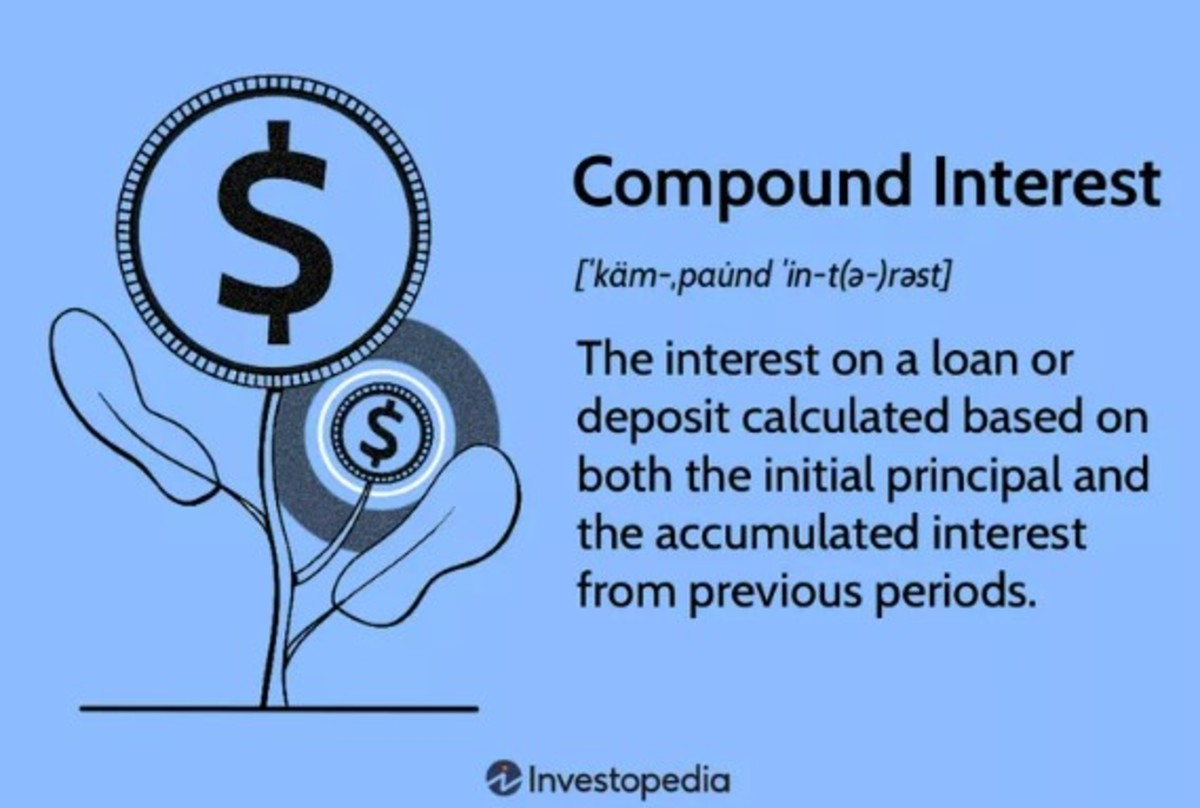Financial Planning for Old Age - Savings and Regular Income in Old Age
Retirement Savings Introduction
When I was in my twenties, I read a wise article about how to make money, this is something I encourage everyone to do, read advice about money. One reason people like to make money is to buy things and go places while young, but eventually you come to the point in life where you need to settle down and think what you want to be doing when your bones begin to ache and you want to sleep half the day. Retirement planning is all about deferring some of your fun today for security in your future. Before you start planning for your future, you should attain a low-level of stability first. A few other uses of money will come up and you should accomplish these basics first. Look for employment with a company that offers retirement benefits.
Accomplish the Basics -- No Debt, Home, Savings, Credit
The basics of financial stability you should aspire for when young so that you have savings for your old age are the following:
1) Establish a good credit history. This means you borrow money, pay it back on time and don't miss a payment. A good way to do this is to save up the money for a purchase, buy it on credit then immediately pay it off.
2) Save up at least 1/2 year's wages. $I0,000 was the value back then but now 10K won't even buy a new car.
3) Buy a home. To do this, you need to have done number one and two and not have other debt.
4) Have health and life insurance. Many good paying jobs offer this but beware of leaving a job and not having this covered.
Once you have done all this, retirement planning to have a steady source of interest payments when you reach old age and don't want to have to work seems easy.
How to Save Money
The best way to save money for old age is to have it automatically get deposited in a 401(k) savings account, savings bond, or bank account, or IRA that is too difficult to touch that you leave the money where it is and don't use it. The left over money coming from your employement paycheck is smaller, but you learn to manage to spend only what you have and have savings.
Which place should I put my money?
1) Savings Bonds -- Savings bonds are usually a good, low risk place to put your money. Their only set back is that their value may not keep up with inflation so that you never get ahead earning money on your money. US I bonds are a good solution because you earn interest on the amount of inflation plus a small rate of interest. Put a small amount of money aside in a savings bond and they can be a life saver in an emergency since you can cash them after 6 months. They are also easy to ignore since they are painful to cash in--you have to sign and address everyone. T-bills and T-bonds are alternatives that you can buy through the US Treasury web page or through a brokerage firm and usually require a much bigger initial amount, $1,000 or $5,000.
2) IRA accounts are easy to set up if you employer doesn't offer an IRA. Check the tax code eligibility requirements before you make deposits. In general, if you don't have any other retirement account, individuals that make $5,000 profit can put that much aside. IRA funds can either be deposited in a regular bank bond or in an investment fund where you can purchase stock or bonds or allow the money to sit in mutual funds that pay interest.
3) Regular bank accounts. These typically offer insurance the money will be there when you go to withdraw it and pay low rates of interest. Bonds and stocks can pay more interest with varying amounts of risk.
The biggest problem most people have with saving is believing they can afford to save. Calculate your average amount of expenses by tracking all your costs for meal, taxes, gas, clothing, medical, vacation, utilities then decide how much of what is left after paying the bills that you are willing to set aside. 50% of your income as soon as you can do so is a good target to shoot in order to earn plenty of money for old age. Beware buying so big of a home that you can't ever save money for your old age or pay it off or enjoy yourself. My dad's wisdom is you should make love to your wife, not your home.
Managing Your Investments
A key factor in managing your investments is understanding stocks. I was told to consider a purchase of stock exactly as if I were handing over $1000-$5000 to my most talented friend. Yikes, you might think. That's why investing in the stock market is risky. You're allowing someone to use their money to operate their business with the expectation they will give you money back in interest payments and they will survive long enough to support your needs in your old age.
To manage your investments to gain wealth in the form of saving for your old age, want to have a minimum of 2% interest payments after inflation return on your money. Stocks that pay dividends, an equivalent to interest payments, are more likely to pay you back your investment than stocks that don't. Some people buy stock because they believe that the stock price will go up, thereby gaining more than a standard rate of interest. A stock does not always gain value. Some companies fail and don't ever return your money. Buy a company that is succeeding so that you earn your interest payments and make money for your old age.
To manage your investments:
1) Keep track of your investment, how much you put in, and how much it returns in interest for your old age.
2) Make sure your investment is paying interest. Some people buy savings bonds and forget about them for so long that they've ceased paying interest. Check them quarterly to insure that your interest payments exceed inflation and that you are earning money for your old age.
3) Don't spend the capital, only spend interest payments from an investment, or better yet, keep the interest payments invested, too.
4) Vary your investments. Own bonds, property, tangibles like gold coins and art, stocks and have them invested in more than one company. That way if the company or bank fails, you still have money elsewhere.
Getting Advice on Investments
Many people don't have a good understanding of what the stock market is so don't invest their money in the stock market. Some suggestions:
1) If you have time, take classes on economics and financial investment. Even retired seniors should do so because it is a fun, interesting hobby as well as a good way to make money for your old age.
2) If you plan on investing your money because someone tells you they can make money for you, make sure this person is credible. A good advisor has credentials, a place of business, is associated with a reputable company, and will provide you regular statements about your money and the amount of interest payment you're recieving. Get a second and third opinion.
3) Learn to use the stock market pages on the internet, buy newspapers like Barron's or magazines like Forbes and read the advice there.
4) Only after you have some idea of a company that you'd like to own, should you consider buying stocks.
5) Only buy stocks of companies you'd like to own as least as long as your car, don't gamble.
How to Decide What Company to Own
Buy a company whose products you use and like is the number one rule of buying a stock. Buy a stock that is worth the cost -- find out about what book value means for a company and try to buy companies whose stock is priced equivalent to the company's value. Don't buy a company that owns too much debt. Make sure the company has a product people want to buy and that is selling. Make sure the company isn't overpaying their executives so that no money is left over for research and development and paying their investors. Don't buy a company when you can't tell what they make or if you can't get information about their finances. Spend several years watching a company's progress before you buy it, you're less likely to be surprised.
When you buy a company, you are using money that could be making a steady interest rate, make sure you are getting more for your value than what a standard insured bank account will supply.
Conclusion: Where to Go From Here
I wrote this article based on experience, a financial management class I took as part of an MBA program and from advice read in many articles over the year and advice from a husband who is an economist.
Saving for retirement is an important part of your overall security in your young and old age. Make sure you have a roof over your head, money to eat and money in the form of interest payments that comes in every month. Additional sources of interest payment income over and above social security, retirement pensions will be used for medical costs, adventure and will disappear when you get older far quicker than you ever imagined. Hope to have some funds where you can use 85% of the interest payments to support your lifestyle. The other 15% of the interest payments will help protect your capital that you never spend, even in your old age.








